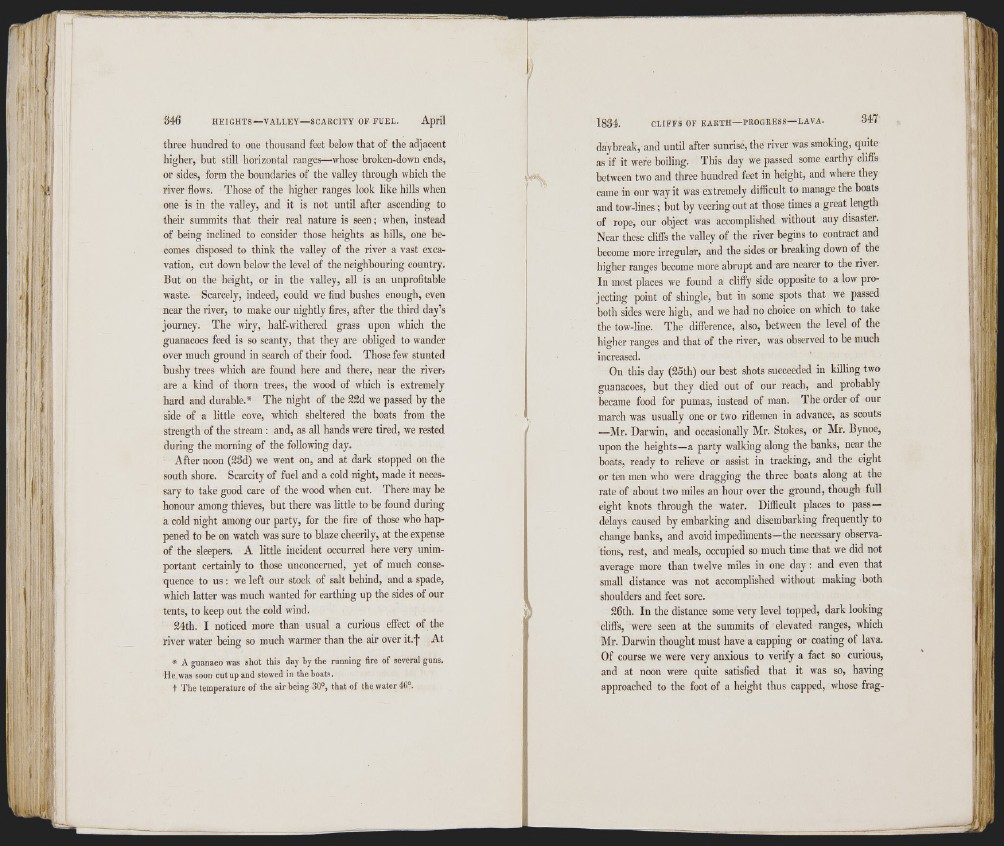
h
'7 '
■. 7'
• I ; I
i i '
k
P
I
y!'
■' 'f i
A
846 H E I G H T S — V A L L E Y S C A R C I T Y O F F U E L . April
three hundred to one thousand feet below that of the adjacent
higher, but still horizontal ranges—whose broken-down ends,
or sides, form the boundaries of the valley through which the
river flows. Those of the higher ranges look like hills when
one is in the valley, and it is not until after ascending to
their summits that their real nature is seen; when, instead
of being inclined to consider those heights as hills, one becomes
disposed to think the valley of the river a vast excavation,
cut down below the level of the neighbouring country.
But on the height, or in the valley, all is an unprofitable
waste. Scarcely, indeed, could we find bushes enough, even
near the river, to make our nightly fires, after the third day’s
journey. The wiry, half-withered grass upon which the
guanacoes feed is so scanty, that they are obliged to wander
over much ground in search of their food. Those few stunted
bushy trees which are found here and there, near the river?
are a kind of thorn trees, the wood of which is extremely
hard and durable.* The night of the 22d we passed by the
side of a little cove, which sheltered the boats from the
strength of the stream : and, as all hands were tired, we rested
during the morning of the following day.
After noon (23d) we went on, and at dark stopped on the
south shore. Scarcity of fuel and a cold night, made it necessary
to take good care of the wood when cut. There may be
honour among thieves, but there was little to be found during
a cold night among our party, for the fire of those who happened
to be on watch was sure to blaze cheerily, at the expense
of the sleepers. A little incident occurred here very unimportant
certainly to those unconcerned, yet of much consequence
to us : we left our stock of salt behind, and a spade,
which latter was much wanted for earthing up the sides of our
tents, to keep out the cold wind.
24th. I noticed more than usual a curious effect of the
river water being so much warmer than the air over it.!
* A guanaco was shot this day by the running fire of several guns.
He. vvas soon cutup and stowed in the hoats.
t The temperature of the air being 30°, that of the water 4(i°.
1834. C L I F F S O F E A R T H I ' l t O G I l E S S — L A V A . 347
daybreak, and until after sunrise, the river was smoking, quite
as if it were boiling. This day we passed some earthy cliffs
between two and three hundred feet in height, and where they
came in our way it was extremely difficult to manage the boats
and tow-lines ; but by veering out at those times a great length
of rope, our object was accomplished without any disaster.
Near these cliffs the valley of the river begins to contract and
become more irregular, and the sides or breaking down of the
higher ranges become more abrupt and are nearer to the river.
In most places we found a cliffy side opposite to a low projecting
point of shingle, but in some spots that we passed
both sides were high, and we had no choice on which to take
the tow-line. The difference, also, between the level of the
higher ranges and that of the river, was observed to be much
increased.
On this day (25th) our best shots succeeded in killing two
guanacoes, but they died out of our reach, and probably
became food for pumas, instead of man. The order of our
march was usually one or two riflemen in advance, as scouts
—Mr. Darwin, and occasionally Mr. Stokes, or Mr. Bynoe,
upon the heights—a party walking along the banks, near the
boats, ready to relieve or assist in tracking, and the eight
or ten men who were dragging the three boats along at the
rate of about two miles an hour over the ground, though full
eight knots through the water. Difficult places to pass —
delays caused by embarking and disembarking frequently to
change banks, and avoid impediments—the necessary observations,
rest, and meals, occupied so much time that we did not
average more than twelve miles in one day : and even that
small distance was not accomplished without making both
shoulders and feet sore.
26th. In the distance some very level topped, dark looking
cliffs, were seen at the summits of elevated ranges, which
Mr. Darwin thought must have a capping or coating of lava.
Of course we were very anxious to verify a fact so curious,
and at noon were quite satisfied that it was so, having
approached to the foot of a height thus capped, whose frag